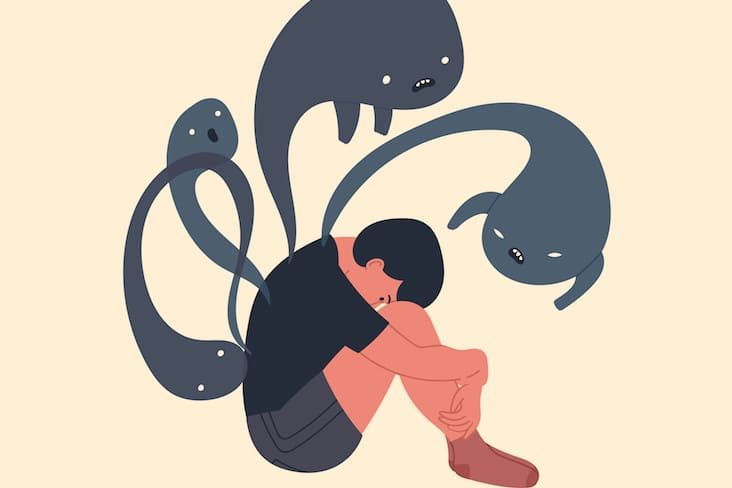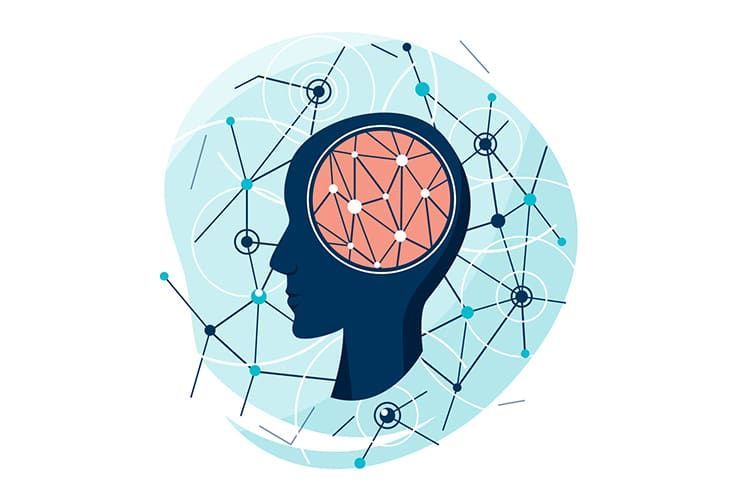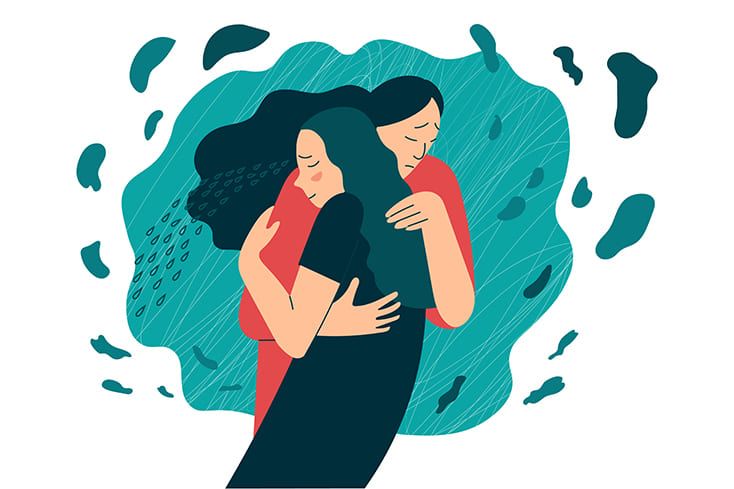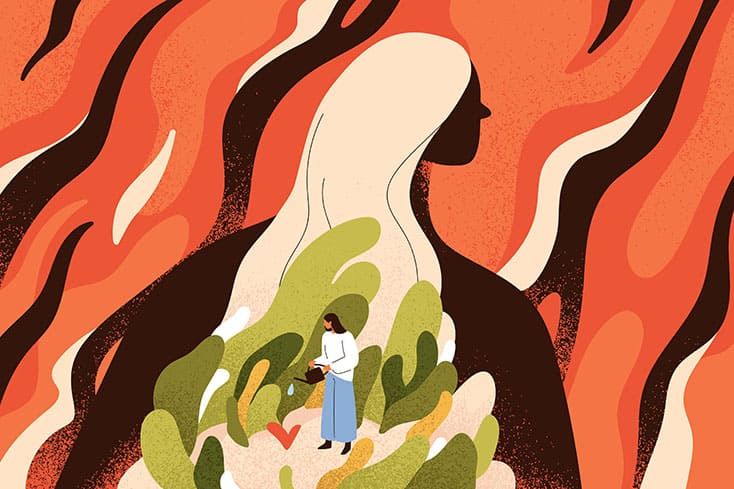重新走出自殺念頭的陰霾 | Finding My Way Back from Suicidal Thoughts
MHACC 雙語部落格 Bilingual Blog
Scroll down for the English Version ⬇️
作者:Joe Dilbert
原始來源: https://www.nami.org/blog-post/finding-my-way-back-from-suicidal-thoughts/
2021年9月10日
2020年2月17日,我站在人生的十字路口,思考著自己究竟是要繼續活下去,還是結束一切。經過兩天不斷地思索自殺,我覺得那彷彿是唯一的解脫方式。我多年來一直與憂鬱症對抗,卻從未向任何人傾訴我的感受。
我從小被教育,不應該談論心理健康,甚至任何情緒都不該表露——那是懦弱的表現。他們說,唯一面對情緒問題的方式就是「撐過去」。所以我照做了。但我後來才明白,壓抑痛苦、忽視情緒,並不是走向康復與內心平靜的答案。
我把憂鬱隱藏起來,誰也沒告訴
我把痛苦埋在心底,就這樣「勉強過活」了好幾年。我結婚、生下了可愛的女兒,開始擔任我熱愛的緩刑官。但在2019年秋天,我開始感到不對勁,不論是身體上還是情緒上。我變得與人疏離,顯得冷淡,卻總假裝一切正常。
妻子曾問我是否一切都好,我總說沒事,還會用工作或其他藉口搪塞。但我的症狀愈來愈嚴重,我感覺大腦出了狀況,卻無法解釋。我極度悲傷,不斷湧現無價值感的念頭,內心總有負面聲音在貶低自己。
沒有協助,我的症狀開始惡化
在我陷入危機前兩週,我首次向妻子坦承自己「不太對勁」,也預約了心理諮商。由於諮商師的時間有限,我必須等待數週才能見面。
我告訴自己要撐住,但事實上,我又一次對自己說謊。自殺的念頭日益強烈,而我只是在等待那場「奇蹟般」的諮商。就在諮商前的那個週末,我的自殺念頭強烈到,我開始擬定傷害自己的計畫。
在那內心的衝突中,有個聲音告訴我:「打電話求助。」我撥打了印第安納大學醫療中心的精神科病房,告訴接線員我情況危急,但對方卻說沒有床位,建議我改聯絡門診部門。
我依照指示撥打門診部門電話,但卻只進入語音信箱。於是我又打回精神科病房,表示我真的非常需要幫助,對方則請我前往當地急診室。最後,我打給妻子,告訴她我有自殺傾向。她立即趕回家,陪我到醫院。
得到適當幫助救了我的命
在醫院,我接受了評估,並被送往精神科照護機構住院四天。一開始我感到羞愧與難堪,但經過住院與一個月的門診治療後,我的視野完全改觀。
參加與我有相同困擾者的支持小組讓我大開眼界——也讓我鬆了一口氣。在這個新社群的幫助下,我學會了應對症狀,也開始正視自己的感受。這是我第一次真正理解,我其實擁有資源,也有在乎我的人願意伸出援手。
這樣的轉變與康復,如果我當時選擇結束生命,是絕對不可能發生的。我鼓起勇氣求助,因此我今天還在這裡。我不只存活了下來,我的人生也變得充實而有意義。
展現脆弱、主動求助確實令人害怕,但有了正確的人在身邊,那種恐懼會很快過去。我希望透過分享我的故事,能鼓勵正經歷憂鬱症狀的人勇敢尋求協助。我找到了重返人生的道路,你也可以。
Joe Dilbert 是一名緩刑官,是 Beth 的丈夫與 Lauren 的父親。在學會透過藥物與他人協助管理自己的心理健康狀況後,他希望透過分享自己的經歷,幫助處於相似情況的人。
Written by: Joe Dilbert
Original Source Here: https://www.nami.org/blog-post/finding-my-way-back-from-suicidal-thoughts/
September 10 2021
On February 17, 2020, I was at a crossroads, deciding whether I wanted to live or die. After contemplating suicide for two days, it seemed like that was the only answer. I had battled depression for years, but I never told anyone how I was feeling.
I was raised to believe that discussing mental health — or any feelings at all — was a sign of weakness. I was told that the only way to address emotional issues was to “get over it.” So that is what I did. But burying the pain and ignoring my feelings, I would come to learn, was not the answer to my recovery or inner peace.
I Hid My Depression from Everyone Around Me
I internalized my pain and “got by” for years. I got married, raised a beautiful daughter and began work as a probation officer, which I loved. But in the Fall of 2019, I began to feel different, both physically and emotionally. I withdrew from everyone around me, becoming visibly distant, but always pretending that nothing was wrong.
My wife would ask me if I was all right, and I would say yes and come up with an excuse about work or something else. My symptoms, however, continued to intensify; I could feel something was going on in my brain, but I just couldn’t explain it. I was profoundly sad, and I had recurring thoughts of worthlessness. I experienced a constant internal monologue of negative self-talk affirming my low opinion of myself.
Without Help, My Symptoms Began to Escalate
About two weeks prior to reaching my crisis point, I told my wife for the first time that I wasn't feeling “right,” and I had made an appointment with a counselor. Due to the counselor’s schedule, I would have to wait for weeks for my appointment.
I told myself I would hold on — but, again, I was lying to myself. The thoughts of suicide became more intense as the days went by, and I waited for the “miracle” of seeing a counselor. The weekend before my appointment, I became so consumed by thoughts of ending my life that I developed a plan to harm myself.
On February 17, 2020, my wife left for work. It was a government holiday, so I stayed home. My daughter was leaving to return to college after visiting home for the weekend. As I watched her drive down the street, I believed that this was going to be the last time I saw her. I started to cry and begged God to help me. I struggled with both wanting and not wanting everything to end.
As I grappled with this inner conflict, a voice told me to call someone. I picked up the phone and called the Indiana University Health psychiatric floor. I told the person on the other line that I was in trouble, and he responded by telling me they did not have any beds and to call outpatient services.
I followed his instructions, but my call to outpatient services went to voicemail. I called the psychiatric floor back and insisted that I desperately needed help, only to be referred to the local emergency room. Finally, I called my wife and told her that I was suicidal. She came home and took me to the hospital.
Getting the Right Help Saved My Life
At the hospital, I completed an evaluation and was admitted to a psychiatric care facility for four days. I was ashamed and humiliated at first. But after the hospitalization and participating in a month-long outpatient treatment program for my depression, I gained a whole new perspective.
Being in a support group with others struggling with the same issue was eye-opening — and, frankly, a relief. With the help of this new community, I was able to cope with my symptoms and learn to pay attention to my feelings. For the first time, I truly understood that I had resources and people who cared about me who were willing to help.
This new perspective, and my subsequent recovery, would not have been possible if I had chosen to end my life. I took a chance on asking for help, and, as a result, I am still here today. I did more than survive — my life has become enjoyable and fulfilling.
Being vulnerable and asking for help is scary, but with the help from the right people, that feeling is short-lived. I hope that by sharing my story of recovery, anyone experiencing symptoms of depression will feel empowered to seek help. I found a way back, and so can you.
Joe Dibert is a probation officer, a proud husband to Beth and a proud father to Lauren. After learning to manage his mental health condition with medication and help from others, he hopes to share his story — as a part of his own recovery and as a tool for helping others in a similar situation.
Sign up for our Newsletter
訂閱每月簡訊獲得最新資訊
Contact Us












